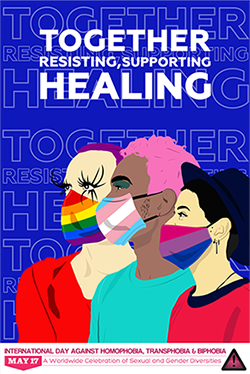International Day Against Homophobia, Biphobia and Transphobia 2021
Strategy 2030 sets out Queen Mary’s commitment and ambition to be the most inclusive university of our kind, anywhere; realising this vision means being a university of choice for LGBTQA+ people to study and work.

The International Day Against Homophobia, Transphobia and Biphobia (IDAHOBiT) is marked globally on 17 May every year to draw attention to the discrimination and violence experienced by lesbian, gay, bisexual and transgender people, and all other people with diverse sexual orientations, gender identities or expressions, and sex characteristics.
The theme of 2021 is Together: Resisting, Supporting, Healing
What is homophobia, transphobia and biphobia?
Homophobia, transphobia and biphobia are terms used to describe the fear or dislike or someone, based on prejudice or negative attitudes, beliefs or views about people who are or are perceived to be lesbian, gay, queer, trans and bi.
This kind of behaviour can take many forms such as name-calling, derogatory jokes, intrusive or hostile questioning, threatening to ‘out’ someone, as well as unwanted physical contact and violence. It can happen verbally, in writing, in person or virtually (eg by email, messages, social media). Whatever form it takes, it is always unacceptable. Find out more information on what homophobia, transphobia and biphobia might look like.
What can you do if you witness or experience homophobia, transphobia or biphobia?
If you experience or witness homophobia, transphobia or biphobia, you can report it (anonymously if you like) and/or access support through our Report + Support tool.
Homophobic, biphobic and transphobic can take many forms and may constitute a criminal offence as a hate incident or hate crime under the Crime and Disorder Act 1998 and the Criminal Justice Act 2003. If you believe you have been a victim of a hate incident or hate crime you are within your rights to contact the police.
If you feel safe to do so, you can be an active bystander and call it out. Make it clear that you won’t tolerate this kind of behaviour in any form.
You could also reach out to one of the following people/groups for support and advice:
- Advice and Counselling Service
- Student Support Officer
- Students' Union
- Togetherall
- Personal Tutor
- There are also lots of external organisations who can offer support, see the list at the bottom of the page.
What can you do to support the LGBTQA+ community and tackle homophobia, transphobia and biphobia?
At Queen Mary, we are committed to creating a learning and working environment that is inclusive of and celebrates LGBTQA+ people. We can all do more to combat homophobia, transphobia and biphobia. Find out more below:
- Read our guidance on how you can be a more supportive and informed LGBTQA+ ally here:
- Read and share our Being a Trans Ally leaflet [PDF]: find out what we mean by ‘trans’ and what you can do to be a better trans ally.
- Read and share our #PronounsMatter leaflet [PDF]: find out what pronouns are, how to use them, and why they matter as well as how you can show your support for gender diverse staff and students.
- Wear a rainbow lanyard and pronoun badge. You can pick these up from HR, Mile End or contact hr-equality@qmul.ac.uk once you have returned to campus.
- Read Queen Mary’s Trans Inclusion Policy Statement [PDF].
- Check out our LGBTQA+ role model profiles, find out more about some of our wonderful students and staff at Queen Mary as they share a bit about themselves, their experiences and what they want you to know about LGBTQA+ inclusion.
Alex Prestage, Head of Equality, Diversity and Inclusion and Executive Officer to the Vice-Principal (People, Culture and Inclusion)
Further information, resources and support:
- East London Out Project (ELOP): a local charity offering a range of support services to LGBTQ+ communities including counselling.
- Tower Hamlets LGBT Community Forum: a project that aims to bring together LGBT+ people (and allies) who live, work, study or socialise in the London Borough of Tower Hamlets.
- Galop: an LGBTQ+ anti-violence charity, providing support services relating to hate crime, domestic abuse and sexual violence.
- Switchboard, LGBT+ helpline: provides information, support and referral service for LGBTQ+ and their friends, parents or family.
- Gendered Intelligence: a charity aiming to increase understanding of gender diversity, specialising in supporting young trans people under 21.
- Mermaids: supports trans and gender-diverse children, young people and their families.
- GIRES: works to improve the lives of trans and gender non-conforming people of all ages.
- Stonewall: campaigns for LGBTQ+ equality.
- Stop Hate UK: provides independent, confidential and accessible reporting and support for victims, witnesses and third parties.